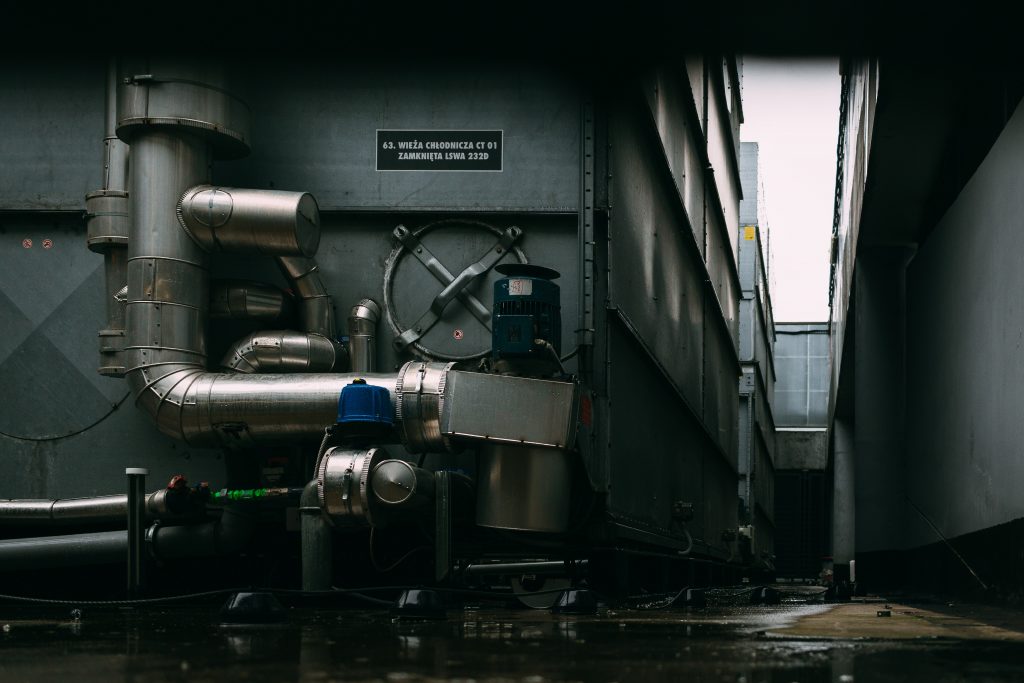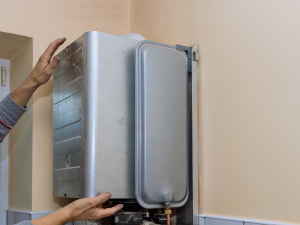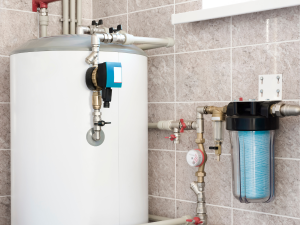Most homes are heated with either boilers or furnaces. However, the decision on which heating system to pick can be confusing for many people. And in most instances, homeowners use the terms boilers, furnaces, and even boiler furnaces interchangeably. Understanding boilers and furnaces in depth can not only help you decide on which system to install but also help you maintain your heating system better and avoid unwarranted costs.
Let’s start with boilers. How do they work?
A boiler system uses steam or hot water to warm a house. Sometimes, boiler systems can be referred to as hydronic systems. Apart from heating homes, they can also be used to de-ice driveways or warm swimming pools. Boilers can either use natural gas, oil, electric energy, or propane as their fuel.
Boiler systems work by heating water that is housed in a boiler. The system then uses a closed-circuit system of pipes that are connected to coils, radiators, and even floor systems to pump water around the house. Heat is transferred to the air or the floor as the water circulates the house. Boiler systems use a water recycling process where the cooled water is pumped back to the boiler, reheated, and recirculated.
Why should you get a boiler system?
- You get an even distribution of heat in the house– Boiler systems distribute heat evenly in the house. This means that you won’t find some warm areas while others are cold. The temperature produced by boiler systems is also consistent and does not dip or peak compared to other heating systems.
- It enhances zone control– Zone control is an essential feature in heating systems that enables users to customize or manage how heat is distributed throughout the house. While some boiler systems are manufactured without the zone control feature, it is easy and simple to add. Also, shutting the radiator valve in a room can help control heat distribution in the house.
- They are cheaper to run and maintain– Boiler systems provide an economic heating solution. While the cost of heating will depend on the size of the boiler, fuel type, local climate, insulation, and preference, it is still cheaper to run than other types of heating systems.
- They are silent– You may barely realize that a house is using a heating system. Boiler systems are extremely quiet, providing the perfect relaxed environment while also enjoying the warmth during the cold seasons. However, older boiler systems can be noisy.
- You get to enjoy clean air– Boiler systems do not rely on air to heat a home. This means that the quality of air is uninterrupted compared to systems that use air to heat a home. Issues such as dirt, dust, allergens will be a thing of the past.
- Low maintenance costs– The costs of maintaining boiler systems are relatively low. This helps homeowners avoid unwarranted costs while also keeping the entire household warm.
Boiler systems have been used for ages. However, they have a few less desirable elements associated with them. While these should not be deal-breakers, it is essential to take note of them and know how to navigate each. Some of these include:
- High installation costs– Boiler systems are expensive to install. For homes that need to be outfitted with all radiators, piping, and other necessary infrastructure, then you might find yourself digging deeper into your pocket. Also, the replacement costs of boiler heating infrastructure are expensive.
- Slower heating response– Boiler systems do not heat instantly. This can be a problem for people who expect instant heat when they change the thermostat.
- They cannot be used to cool the house– Installing a boiler heating system will require a separate cooling option.
- You may experience overheating problems– Boiler systems can overheat especially in situations where one does not have full control of the system. When this happens, lowering the temperature can take a while. Not only is this uncomfortable but also leads to energy waste.
Let’s talk furnaces
Furnaces are one of the oldest heating systems used in homes. While in the past furnaces used coal or firewood to heat a space, they now use oil, propane, gas, or electricity. Furnace heating systems work by converting energy into heat. This is then distributed to the house using vents and ducts in the walls, floors, or ceilings.
Why should you install furnace heating systems?
- They are more affordable– The average cost of furnaces ranges between $2,000- $3,500. This is very affordable compared to other heating systems such as boilers. You can schedule an appointment with an ac technician to help you install one.
- They are easy to install– Furnace installations are not complicated, and can take a few hours to install.
- Fewer risks of leaks– Furnace leaks can occur. However, the hot air often clears in a short period. This prevents damage that can be caused by other types of leaks such as boiler system leaks.
So, what are the cons?
- Furnace systems are noisy– If you want a quiet heating system, then furnaces may not be the best option.
- Reduced efficiency– While they are cheaper to install and maintain, more fuel is used, which increases your energy costs.
- Poor air quality– Furnace heating systems interfere with air quality in your home. This is because other impurities such as dust and different types of allergens are blown through the system to your home.
Boiler vs. Furnace: Which one should I install?
The choice of whether to install a boiler or furnace heating system is not an easy task. However, here are some factors that should guide you.
- The heat type– Do you want hot water or heated air circulation in your home? If you want a heating system that uses hot water, consider installing boilers. However, if you think that boilers are a huge risk, then heated air systems will work best for your home.
- What about allergens? – If anyone in your home suffers from pollen and other allergies, a furnace heating system will aggravate this.
- Operating costs– How much do you intend to spend on the heating system in terms of operation and maintenance?
- The initial cost– While gas furnace systems are cheaper than boiler systems, do not use your budget as the only determinant. Be sure to also consider efficiency, safety, and energy cost.
- Comfort – If you prefer a quiet heating system, consider installing a boiler system.




